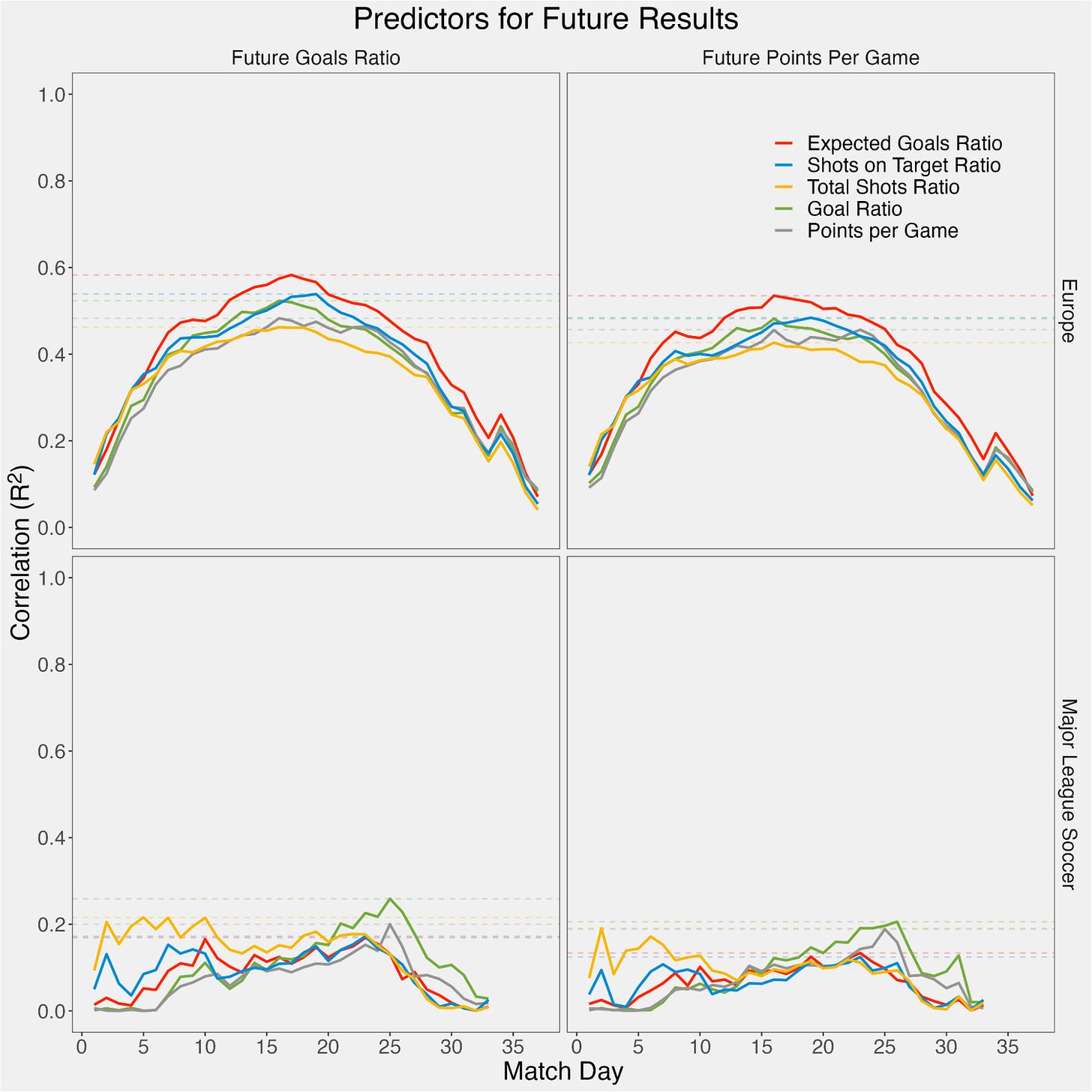Theory of Soccer: Structure & Narrative
Fish like structure
Have you ever tagged along with a friend to a sporting event that you know nothing about? Have you ever invited a friend along to a soccer match who doesn’t follow the sport at all? Have you ever out of boredom tuned in to a random sports channel to follow a niche sport and decided to get into it for half an hour? Normally the first question that comes out of anyone’s mouth in these situations is:
“So who’s supposed to win this?”
We talk about parity and luck a lot here, and of skill and the interaction of the these different factors in soccer and sports. When you zoom all the way out though, there’s an important foundational assumption there that we’re supposed to understand, which is that in sports, there should be some level of distinction between the competitors such that when it comes to the all-so-important measurement of winner and loser (the score let’s say), even if it doesn’t do a great job of picking the most talented competitor nor the competitor that tried the hardest (because of the various interactions between chance and these other things), it’s at least clear and obvious that its the goal, or its insinuation. There’s an expectation. We’re holding a game to see which of these teams gets to be the winner and which the loser and in theory the winner is the better one.
This is important structure in sports. We are able to form expectations from this structure, and then we can compare results to expectations to get… narrative.
The results needn’t match our expectation. If they always did, we would eventually lose interest. Without expectations, we have results, but we don’t have stories. Stories are how you grow the game.
Major League Soccer needs better stories
Major League Soccer needs better stories. It’s not that it needs complicated stories. It’s not even that it needs better or richer characters for these stories. And it’s not that it needs a media apparatus that more efficiently unearths these stories and publishes them (although I wouldn’t hate it!). It just needs to have the basic, dumb, brute-force stories to emerge. The stories any casual fan could understand. These stories don’t require finessing, they don’t require access, and they don’t require controversy.
MLS needs some teams that should win, and it needs some teams that should lose. And then it needs that to either happen or not happen. By identity, it already has teams that win and teams that lose — that’s not the problem — but it needs clear expectations for which ones are going to do which, so that then when the miracle of soccer happens (that mystical combination of skill, luck, effort, energy, and beauty), and then some teams win and some teams lose, we get stories.
Sure, if you’re doing a pre-game show before an important MLS playoff game, by all means profile a couple of players. Give us the cliff notes on the last time these two teams played each other. Show us the lineup graphics and make the vaguest of references to tactics. Pontificate about the future of the head coaches, about which players might… leave MLS and go to Europe I guess if you really have to. But understand that none of that has any juice whatsoever unless the audience knows which one of these teams is supposed to win and which one is supposed to lose. And I’m not saying you need to tell them. I’m saying it shouldn’t need to be discussed at any length really. It should be already there, obvious to anyone who knows how sports work and right now it isn’t obvious at all, and that’s by design.
As discussed in a recent post, while the lowest spending Premier League team is paying wages of something like 10-20% of the top team’s wage bill ($30-$40M vs $250+M), in Major League Soccer, the rules intentionally set it up to be more like $10M vs $25M (at the extremes) with most teams in the middle spending relatively similar amounts (by rule).
When some teams have more resources than other teams, they typically perform better and so the distribution of team performances on the field in both leagues shows the results of these two different environments
You can see a noticeably more stratified Premier League, although it’s admittedly not 10x more stratified in part because soccer is full of chance (even before we start talking about shot conversion, intentionally excluded from this chart). Soccer naturally compresses the performances/results of teams. It gives you some slack to allow for differences in spending.
When the uninitiated soccer fan tags along to an MLS game, or even a season ticket holder who doesn’t have time to keep tabs on all 29 MLS teams asks me “so who’s supposed to win this?” I always just shrug.
Skippable note: MLS has a base salary budget per team of $5.5M to roster 20 senior players, but 3 of those players can earn limitless wages and only count for let’s call it $0.7M. Then teams get another $5-$7M of budget space to use in various ways, primarily to decrease the cap hit of players that make less than $1.7M. All in, most teams spend between $13M-$18M. In 2024, Inter Miami spent $30M and Montreal spent $10M.
Messi & Friends
There has been one important narrative in the most recent year and a half in MLS. It’s not the only thing MLS Media have covered over the last couple years (even if most fanbases carry that sentiment), but it’s realistically the only major storyline the national media have covered at all.
That’s Inter Miami signing Lionel Messi, Luis Suarez, Sergio Busquets, Jordi Alba, Julian Gressel, Tata Martino and a bunch of other good players over the last year and winning a bunch of games.
That is to say, one team has spent enough money, more than other teams, to naturally create a story dynamic where they were expected to win a lot in 2024. We did not need the media fawning over the greatest player to ever play soccer being in MLS in order to create a natural, effortless, interesting story (although I understand why you would want to amplify the specifics for other reasons). It was simply the case that Miami, by bringing in famous players including the best player ever was able to just about separate the talent level on their team from the talent level of other teams to the point where there was an expectation about the results of their games that made them compelling for everyone. And interestingly, they didn’t win the cup! Narrative! They were knocked out by an Atlanta United team that … kinda got the better of them whenever they faced off in the regular season. And did Miami even really separate itself, is there further they can stretch this balloon? MLS people might know that Inter Miami is in the dead middle of that distribution chart above, not even at the top of the MLS dots, like their points totals suggested. Despite finishing their chances incredibly well all year, the underlying numbers always a little cast doubt on their dominance (the kind of doubt that arises when you watch 40 year old superstars chase twenty something guys around midfield even as though 40 year old superstars kick the ball pretty damn well).
MLS After Dark
MLS is super fun in part because of how chaotic and random it is, and that works just fine for the pretty small subset of fans who like to obsess over the league as a whole, over and above following along like a normal obsessive fan would to their home team’s shenanigans. But I also understand MLS needs to grow. That was part of the whole reason for bringing in Messi, signing a 10 year AppleTV deal. But where it wants to grow to surely is to a scenario where casual soccer fans become obsessive MLS fans.
Sketching out a conversion chain below:
To get casual soccer fans or casual sports fans to become obsessive home town fans, you get them in the stadium and show them a good product. But, to get either obsessive home town fans or casual soccer fans to become obsessive MLS fans you have to be generating narratives, and not the very specific ones about specific players that casuals don’t already know, the effortless kind of narratives like “Team A is really good, they are on record setting pace” and “Team A is really good, have you seen what Player A has been doing?” and “Team A is really good, but did you see what happened last night! Team B upset them!” and “Team A should be good but it’s not working out right now, is their coach safe?” etc etc.
I’m sure MLS execs want their own “F1: Drive to Survive” show where they have cameras following around MLS players and coaches hoping that some scandalous drama plays out in intense ways on the screen. But they need to stop and consider the effortless narrative that F1 starts with because of having a few dominant teams (when the show debuted it was one dominant team and a bunch of unmitigated disasters if I remember correctly). Make sure the audience understand the expectations for the sporting events, so they can effortless see why the results are compelling or worth tuning in for. Don’t make the audience do mental gymnastics to find where the story starts. Don’t make them learn about Player 1,2,3’s background and how he loves his mom and how his dad was hard on him. That stuff only works if they already care. Don’t build your narratives around how anything can happen in MLS, or around how the players have to fly coach class and wait in airport lobbies like the rest of us. You shouldn’t have to be interested, that has to already be there.
How do you allow for your audience to effortlessly understand the expectations around teams and games? You let the teams separate themselves from one another, financially and then on the field. Some teams are going to get better and draw some casual attention. Some teams are going to get worse and it will strain their fanbases, but you’re trying to grow. You need the uninitiated to understand immediately what’s going on.
Give them some structure, around which to explore.
Further Reading:
Further discussion on many things, but at least partly on the addictive narrative quality of comparing results to expectations:
Further discussion by ASA on predictiveness of analytics metrics and how MLS’ parity makes things weird:
https://www.americansocceranalysis.com/home/2022/7/19/the-replication-project-is-xg-the-best-predictor-of-future-results
https://www.americansocceranalysis.com/home/2022/7/20/europe-money-and-the-problem-with-disparity
Further discussion about what makes soccer particularly random
On Randomness (and Parity)
·I read back through the last post about football tactics and dice rolls, and I thought of some ways to clarify/summarize it, so that might be helpful.









So the call is to generate stories by loosening the goal of parity, and thereby creating good guys and bad guys. Giants and weaklings.
But meanwhile the NFL is a hard cap league and the NBA cap is getting harder and harder and yet they are fantastic sellers of the league. Even though the Celtics dominated last year the league did a great job creating the narrative that they might flop in the playoffs.
What MLS needs is a management team that knows the storylines and stars outside of Miami are critical and works to build them. They need a deliberate strategy.
Really good read. Completely agreed with your point. Unfortunately, I think the largest cause of this problem is the simple lack of relegation which doesn’t seem likely to be introduced anytime soon. The story of Leicester winning the Prem ans getting relegated a few seasons later, only to be brought back up by Vardy & co. just cannot happen in the MLS